Munnings Surname Ancestry ResultsOur indexes 1000-1999 include entries for the spelling 'munnings'. In the period you have requested, we have the following 101 records (displaying 1 to 10): Single Surname Subscription | | | Buying all 101 results of this search individually would cost £594.00. But you can have free access to all 101 records for a year, to view, to save and print, for £100. Save £494.00. More... |
These sample scans are from the original record. You will get scans of the full pages or articles where the surname you searched for has been found. Your web browser may prevent the sample windows from opening; in this case please change your browser settings to allow pop-up windows from this site. Liegemen and Traitors, Pirates and Spies
(1626)
The Privy Council of Charles I was responsible for internal security in England and Wales, and dealt with all manner of special and urgent matters
MUNNINGS. Cost: £4.00.  | Sample scan, click to enlarge
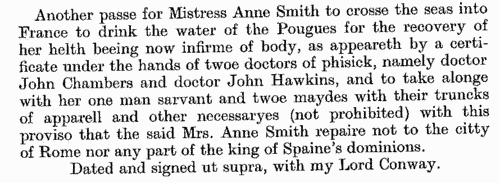
| Official Papers
(1651)
The State Papers Domestic cover all manner of business relating to Britain, Ireland and the colonies, conducted by the Council of State, as well as other miscellaneous records. These records are from January to October 1651.
MUNNINGS. Cost: £4.00.  | Sample scan, click to enlarge

| Middlesex Sessions
(1625-1666)
Incidents from the Middlesex Sessions Books. These are abstracts of sessional orders, minutes of criminal cases, memoranda and other entries of record taken from the volumes of Gaol Delivery Register, Books and Rolls, Sessions of Peace Register, and Process Books of Indictments for the county of Middlesex from the death of king James I to the Great Fire of London. The references at the end of each item indicate the volume in question, the abbreviations being G. D. for Gaol Delivery, S. P. for Sessions of Peace, and S. O. T. for Session of Oyer and Terminer; occasionally preceded by S. for Special or G. for general, or followed by R. for Roll or Reg. for Register. It should be noted that, in the case of 'true bills' or indictments, the abstract starts with the date on which the offence took place, the date of the conviction &c. being at the end of the entry. These abstracts, prepared by John Cordy Jeaffreson for the Middlesex County Record Society, are far from being a complete calendar of these extensive records; his purpose was, in part, to notice 'every parchment that should exhibit a famous person's name or any other feature of personal interest'.MUNNINGS. Cost: £4.00.  | Sample scan, click to enlarge
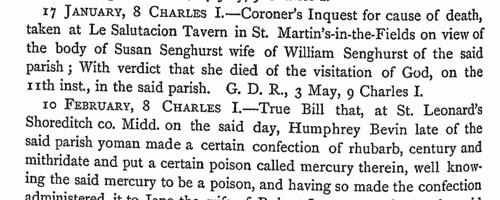
| Official Papers
(1670)
The State Papers Domestic cover all manner of business relating to Britain, Ireland and the colonies, conducted in the office of the Secretary of State as well as other miscellaneous records. Includes lists of passes to travel abroad. There is also some material in this source from 1660 to 1669.
MUNNINGS. Cost: £4.00.  | Sample scan, click to enlarge

| Allegations for marriages in southern England
(1687-1694)
The province or archbishopric of Canterbury covered all England and Wales except for the northern counties in the four dioceses of the archbishopric of York (York, Durham, Chester and Carlisle). Marriage licences were generally issued by the local dioceses, but above them was the jurisdiction of the archbishop, exercised through his vicar-general. Where the prospective bride and groom were from different dioceses it would be expected that they obtain a licence from the archbishop; in practice, the archbishop residing at Lambeth, and the actual offices of the province being in London, which was itself split into myriad ecclesiastical jurisdictions, and spilled into adjoining dioceses, this facility was particularly resorted to by couples from London and the home counties, although there are quite a few entries referring to parties from further afield. The abstracts of the allegations given here usually state name, address (street in London, or parish), age, and condition of bride and groom; and sometimes the name, address and occupation of the friend or relative filing the allegation. Where parental consent was necessary, a mother's or father's name may be given. The ages shown should be treated with caution; ages above 21 tended to be reduced, doubtless for cosmetic reasons; ages under 21 tended to be increased, particularly to avoid requiring parental consent; a simple statement 'aged 21' may merely mean 'of full age' and indicate any age from 21 upwards. These are merely allegations to obtain licences; although nearly all will have resulted in the issuing of the licence, many licences did not then result in marriage. MUNNINGS. Cost: £4.00.  | Sample scan, click to enlarge

| Treasury Books
(1700-1701)
Records of the Treasury administration in Britain, America and the colonies, from October 1700 to December 1701.
MUNNINGS. Cost: £4.00.  | Sample scan, click to enlarge
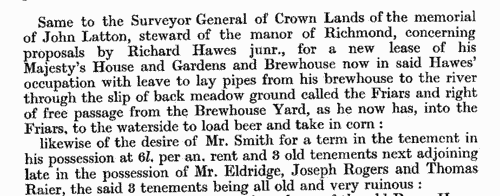
| Boys entering Gresham's School
(1711)
The Sir John Gresham Grammar School at Holt in Norfolk was founded by sir John who bought the manor house there in 1546 to convert it into a school, and building work had started by 1555. To celebrate the quatercentenary in 1955, a history of the school written by the Reverend C. L. S. Linnell was published, together with an Alumni Greshamienses, a register of boys entering the school from 1562 to 1954, compiled by A. B. Douglas. The materials to hand for the register for the early years were slight; the first coherent lists of boys survive only from 1729, and then are fitful, with little detail, and largely missing from 1784 to 1803; however, from 1810 onwards the names of boys' parents are usually recorded. The register is arranged chronologically by year (and from 1900 by term - L, Lent; M, Michaelmas; S, Summer), and then alphabetically by surname (in capitals) and christian name(s). Where known, year of birth is then given (in brackets), names, addresses and occupations of parents. From 1900 onwards there are italic abbreviations for sporting achievements at school (h, hockey colours; VIII, shooting colours; S, first-class swimmer; XI, cricket colours; XV, football colours), and p for house prefect and P for school prefect; then (in italics) information about the boy's adult life, and his address (where living) at the time of publication. Finally, on the right hand side of the page, in italics, is given the year of his leaving the school. Most detail is absent before 1810; and, of course, for the boys still at school in 1955, or only recently left, there are no details of future career; nor are there the usual details about their parentage. From 1898 onwards day boys are noted with an italic D (N means Newquay dayboy); and from 1900 onwards the school houses are shown (B, Bengal Lodge; F, Farfield; H, School House or Howson's; K, Kenwyn; O, Old School House; W, Woodlands); and, for the junior school, c, Crossways; k, Kenwyn; o, Old School House).MUNNINGS. Cost: £4.00.  | Sample scan, click to enlarge
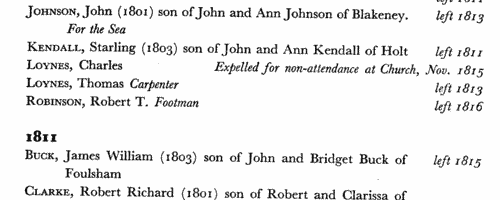
| Persons Insured by the Sun Fire Office, London
(1714)
This list of the persons insured by the Sun Fire Office, London, gives full name (surname first), occupation (in italics), and the letter g (for goods) or h (for house) indicating the nature of their policy. Those with more than one g or h, have so many policies. An appendix lists those entered since, and omitted in printing the list, which was published in instalments from February to March 1714.MUNNINGS. Cost: £6.00.  | Sample scan, click to enlarge
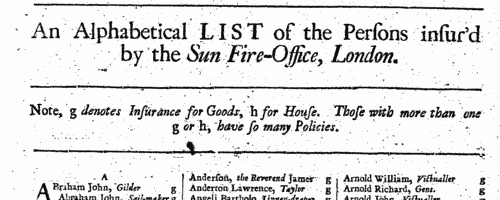
|  Apprentices registered in Suffolk
(1715-1717) Apprentices registered in Suffolk
(1715-1717)
Apprenticeship indentures and clerks' articles were subject to a 6d or 12d per pound stamp duty: the registers of the payments usually give the master's trade, address, and occupation, and the apprentice's father's name and address, as well as details of the date and length of the apprenticeship. There are central registers for collections of the stamp duty in London, as well as returns from collectors in the provinces. These collectors generally received duty just from their own county, but sometimes from further afield. Because of the delay before some collectors made their returns, this register includes indentures and articles from as early as 1714. (The sample entry shown on this scan is taken from a Norfolk return)MUNNINGS. Cost: £8.00.  | Sample scan, click to enlarge

|  Masters and Apprentices
(1720) Masters and Apprentices
(1720)
Apprenticeship indentures and clerks' articles were subject to a 6d or 12d per pound stamp duty: the registers of the payments usually give the master's trade, address, and occupation, and the apprentice's father's name and address, as well as details of the date and length of the apprenticeship. 1 January to 3 September 1720.MUNNINGS. Cost: £8.00.  | Sample scan, click to enlarge

|
Research your ancestry, family history, genealogy and one-name study by direct access to original records and archives indexed by surname.
|













